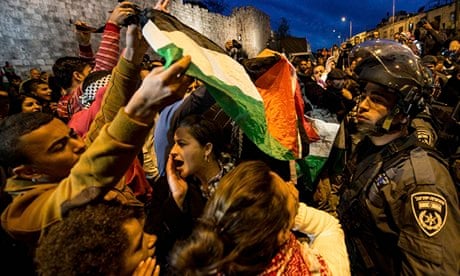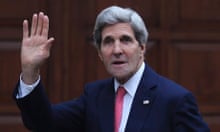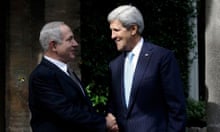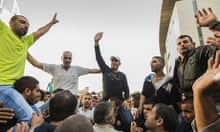Several thousand people worldwide have taken part in protests at the Israeli government's plans to forcibly remove Bedouin Arabs from their villages in the Negev desert.
In Israeli towns and cities, mounted police used teargas, stun grenades and water cannon against demonstrators, in what the Association for Civil Rights in Israel described as a "disproportionate" response to stone-throwing. More than 40 people were arrested at protests across the country, and 15 police officers were injured.
In what was billed as an international "day of rage", demonstrations were also held in London, Berlin, Rome, Istanbul, Cairo and in the US.
Binyamin Netanyahu, the Israeli prime minister, criticised the protests. "We will not tolerate such disturbances," he said in a statement. "Attempts by a loud and violent minority to deny a better future to a large and broad population are grave. We will continue to advance the law for a better future for all residents of the Negev."
Under the Prawer Plan, which is expected to pass into Israeli law by the end of the year, 35 "unrecognised" Bedouin villages will be demolished and between 40,000 and 70,000 people removed to government-designated towns. Israel says the proposal will bring benefits such as permanent housing and public services, but the majority of Bedouin say they do not want to give up their ancestral lands and way of life.
"We have been living here since before the creation of the state of Israel," Maqbul Saraya, 70, told Al Jazeera. "We feel that democracy and justice in Israel do not apply to us."
More than 50 public figures in the UK criticised the plan in a letter published in the Guardian, saying it would "mean the forced displacement of Palestinians from their homes and land, and systematic discrimination and separation".
The "unrecognised" villages in the Negev lack running water, electricity, landline telephones, roads, high schools and health clinics. The Bedouin – who are Israeli citizens – comprise about 30% of the Negev's population but their villages take up only 2.5% of the land. Before the state of Israel was created in 1948 they roamed widely across the desert; now, two-thirds of the region has been designated as military training grounds and firing ranges.
Under the Prawer Plan, the residents of "unrecognised" villages will be moved into seven overcrowded and impoverished towns. Meanwhile, new Jewish settlements are planned for the region.
In response to the demonstrations, Israeli foreign minister Avigdor Lieberman said: "We are fighting over the national land of the Jewish people and there are those that intentionally try to steal that land and control it by force. It is impossible to close our eyes and run from this reality."
In a statement emailed to the media on Saturday night, the body that co-ordinates Israeli government policy on the Bedouin criticised the protests on Saturday. "Extremists, many of whom are not Bedouin, chose to divert the open debate about a purely social and humanitarian cause into a confrontation, falsely linked to the Palestinian issue," it said.
The Prawer Plan was aimed at providing "adequate housing, public services and a better future for [the] children" of the Bedouin population in the Negev. It would allow them to "integrate into the fabric of a modern state while preserving their traditions," said the statement.




